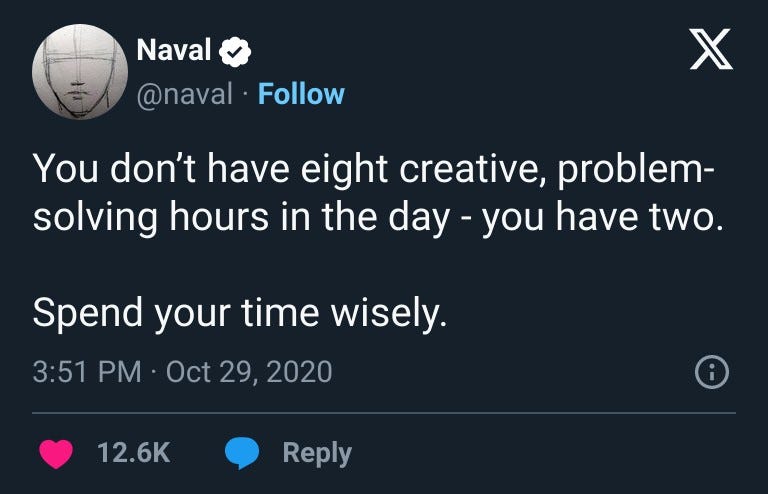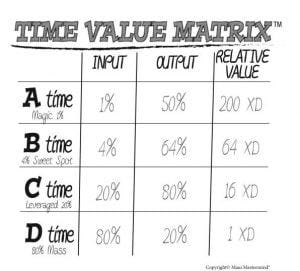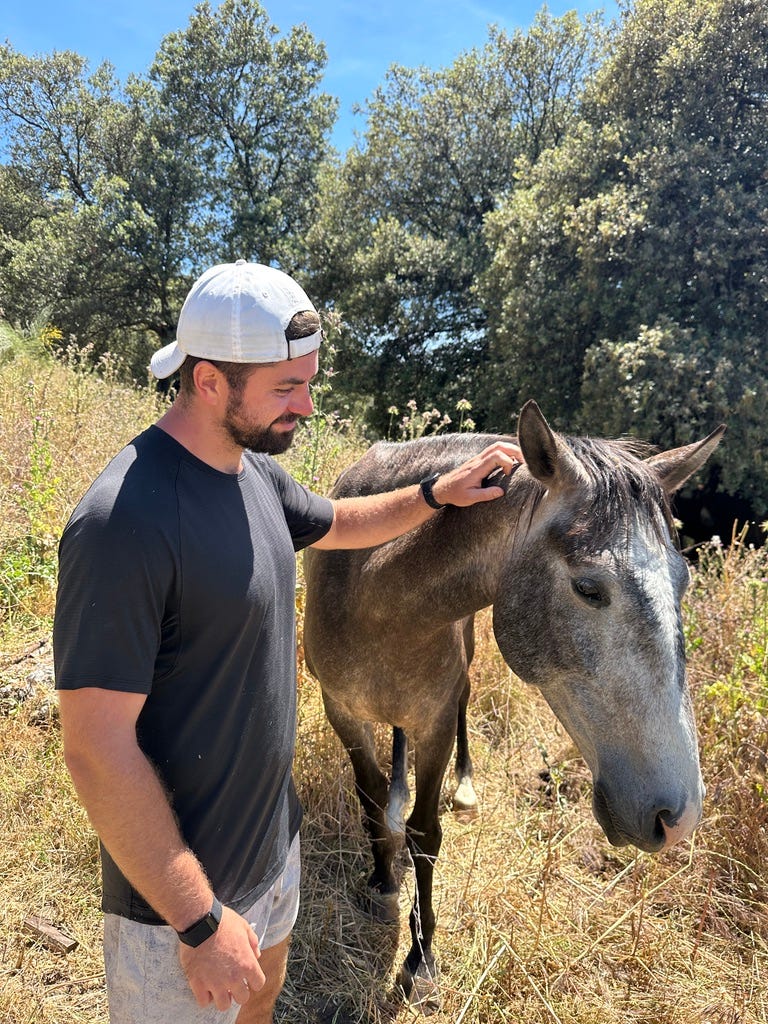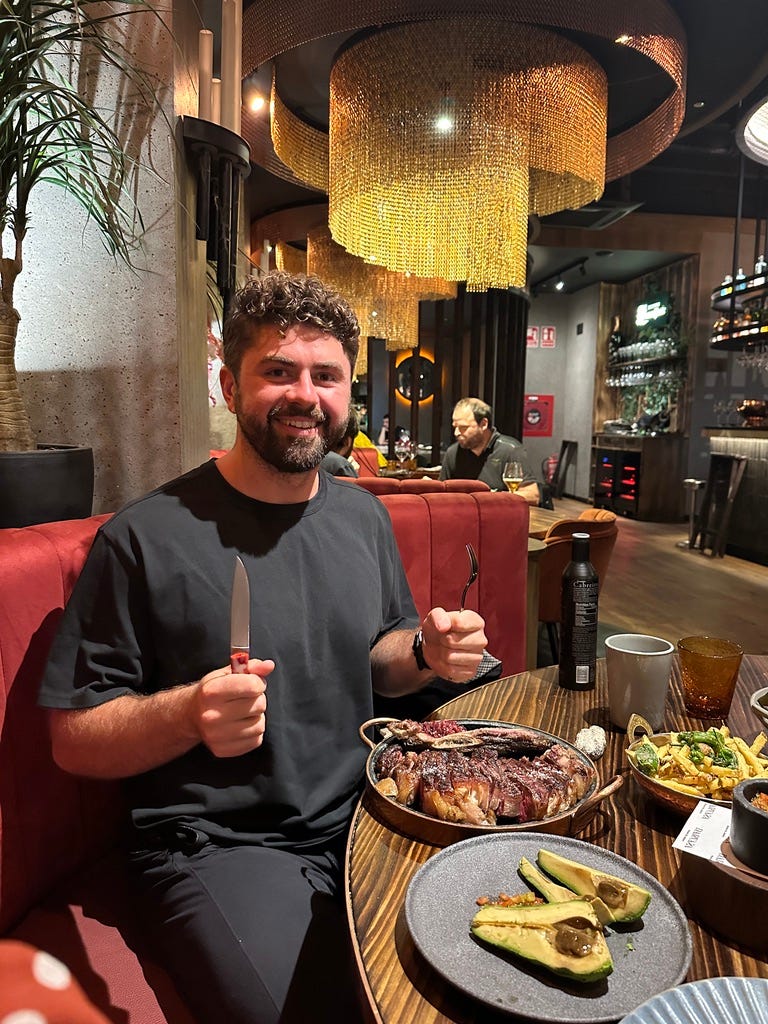8 Important Lessons I Want To Stamp Into My Brain (From The First Half Of 2024)
Taking a second to reflect on what I've learned so far this year
Greetings from Amsterdam! 🇳🇱🇳🇱
Today marks the halfway point of 2024.
I’ve learned a lot this year—specifically, 9 lessons:
Life gets a lot easier when you view every problem as a skill issue
There will never be the “perfect” set of conditions—so kill your “onces” and start immediately
You will learn most lessons 7+ times before you internalize them
You only get 2 hours of “real work” done per day (and those 2 hours take 4)
The 80/20 of 80/20 is 64/4 -> 4% of the inputs lead to 64% of the outputs
Standards naturally deteriorate over time—you must fight to uphold them
Invest more time finding the one decision that eliminates 1,000 decisions
Satisfaction = expectations — reality
Let’s dive into each of them:
1. Life gets a lot easier when you view every problem as a skill issue
This idea does 2 things:
Puts the power to improve a situation in your hands, rather than external factors
Creates a clear solution starting point for every problem: you getting better
For example:
Body aching? It’s not your age, you lack the skill of injury prevention
Getting poor sleep? It’s not your environment, you lack the skill to create an ideal sleep routine
Struggling to grow your distribution? It’s not the algorithm, you lack the skill of capturing & keeping attention
Employee underperforming? It’s not because they’re lazy, you lack the skill of aligning incentives, leadership, and mentorship
To put this idea into practice, I made a list of several areas where I feel “dissatisfied” or have a recurring problem.
Then, I identified the exact “skill” that would solve my problem if acquired.
Simple? Yes.
Easy to acquire? No.
But now I’m waking up every morning and slowly chipping away at the list like I’m leveling up a video game character.
2. There will never the “perfect” set of conditions—so kill your “onces” and start immediately
Most people live their life in “Once Land”
Once my kids are born… then
Once work slows down… then
Once my kids move out… then
Once I move to that new city… then
Once I finish reading this book… then
Once I break up with my boyfriend… then
Once I have the perfect 12-step plan… then
The problem?
These “onces” never go away.
After one comes another, then another, then another.
And before you know it, you’re dead.
Instead, the second you find yourself delaying something until the conditions are just right, you should immediately take a step in that direction.
Time moves too quickly to wait for onces.
3. You will learn most lessons 7+ times before you internalize them
It’s meta, but this is the most important lesson on my entire list.
Here’s the story of how I came to this realization:
Every Saturday morning, I crack open my Muji journal and think about my lessons from the week.
Typically, I write 4-5 bullets based on different things that happened over the prior 7 days.
But as this year has gone on, I’ve found myself continuing to write down the same things over and over again.
At first, I was hesitant to add something I’ve already “learned” to the list.
So instead, I kept searching for “new” lessons to learn, rather than drill the same ones into my head over and over again.
But after a few rounds, I found it harder and harder to come up with anything novel.
So now, I revisit the same list of “already learned” lessons and try to apply them to things that happened.
Luckily, I’ve been documenting them for years (like my 2022 and 2023 reviews) so I have a solid starting ground.
'People need to be reminded more often than they need to be instructed.' — Samuel Johnson
4. You only get 2 hours of “real work” done per day, and it often takes a block of 4 hours
Being in Europe with a US-based team is deep work arbitrage.
Every morning, for the first ~6 hours of my day, I am unreachable.
While the espresso works through my veins & deep work beats pump through my AirPods, 95% of the people I talk to daily are asleep.
This has done wonders for my morning productivity.
But I recently started to “time” how much time I spent doing deep work.
I would have 9 AM to 1 PM blocked on the calendar, roughly 4 hours. But between ordering coffee, taking breaks, using the bathroom, etc., I was only “working” for 2 of those 4 hours.
Now, this is fine, because I always underestimate just how much you can get done during a block like that.
And compounded every day for weeks and months, this block is all I need to move the needle forward.
But I realize now that getting a good chunk of work done daily requires more time than I originally thought, which increases the importance of saying “no” to small things (so I can focus on the big things).
5. The 80/20 of 80/20 is 64/4 -> 4% of the inputs lead to 64% of the output
And you can take this a step further: 1% of the inputs lead to 51% of the output.
It’s easy to get caught up in the complex minutiae the world tries to sell you as the solution.
But most things in life come from doing the dead-simple basics, repeatedly, for longer than the average person is willing.
And the big implication here: you can get 64% proficient in something by learning the 4% of the basics—which does not take very long at all.
And being 64% proficient in anything will put you ahead of 95% of people
6. Standards naturally deteriorate over time—you must fight to uphold them
When something is not constantly maintained or improved, it will slowly die.
• Relationships
• Reading habits
• Body composition
• Apartment cleanliness
• Exercise & fitness routines
• Team member performance
The list goes on & on.
But because it happens slowly, it’s impossible to notice—until it’s too late.
So—how to prevent this?
First, it’s to recognize this natural trend & fight it in real-time. Creating a standard and constantly measuring performance relative to it in real-time. This prevents deviation & downtrends from happening in the background.
Second, if something has gone too far below baseline, it may need a “hard reset” to get back to its previous level. Like a new football coach taking over a losing team, you must implement a list of sweeping changes to shed the old culture and start fresh.
7. Satisfaction = expectations — reality
Everything is relative.
You can interpret the same situation as good or bad based on its comparison.
Getting a 10% raise is great if you expected 5%, but horrible if your colleague got 20%
Dinner tastes great if you haven’t eaten in weeks, but sucks if the waiter messed up your order
Running a 3-hour marathon is a world-class accomplishment unless you were gunning for 2:55
Losing 20 pounds feels great unless you set the goal to lose 50
I could make a list of 1000 examples to drive this idea home.
Luckily, you can use this to your advantage in 2 ways:
Reframe reality. When you have a feeling of disappointment, switch your perspective to one that would willingly exchange situations with you.
Lower your expectations. Build things up less in your head—whether it’s someone else’s actions or circumstances out of your control. Worst case, they meet the lowered bar. Best case, they exceed them (and you feel better as a result)
8. Invest more time finding the one decision that eliminates 1000 decisions
When I first got to Amsterdam, I had an environment shock.
Suddenly, everything I had once had on autopilot now required a decision.
Where I would work
Where I would exercise
Where I would get coffee
What time I would wake up
What I would eat for the day
What time I would go to sleep
What route I would take to work
What time of days I would take meetings
And I spent my first two weeks here making them time and time again.
14 days in, it felt like I hadn’t accomplished a single lick of work.
Why?
On their own, each of these trivial decisions doesn’t seem like much. But added together, they sucked up all of my cognitive bandwidth.
Unfortunately, most people (my former self included) spend their entire lives this way. They only unlock 20% of their potential because these repeated decisions hog 80% of their brain space.
Luckily, I’d built this “decision-eliminating muscle” in the past. So now I’ve settled in and returned to operating with efficiency.
But that initial 14-day shock period reminded me of its importance.
For a deeper dive, check out Death By 1000 Cuts by Sam Ovens and 1 Decision That Removes 1000 Decisions by Tim Ferriss
Aaaand that’s it.
Lots to chew on from the first half of the year.
Excited to see what the next 6 months hold.
If you have any questions on one of these lessons please hit reply and let me know. I read and reply to every one of them.
Also, I plan on writing this newsletter pretty regularly for the rest of 2024. But I’m publishing something daily on Twitter/LinkedIn, so follow me there for more frequent updates.
Now onto the…
📝Monthly writing recap
These were my popular pieces of writing from the past few months:
The 10 writing tips from the father of advertising: David Ogilvy. In 1982, Ogilvy sent a memo titled “How To Write” to his staff. It’s a masterclass in effective writing.
How I break out of “Writing Ruts.” This is a simple 3-step framework I use every time I’m overthinking, succumbing to perfectionism, or procrastinating on my writing.
A breakdown of how I carry out my End-Of-Day survey. This is one of the most powerful personal development tools I’ve used in the last few years.
The 7 staples of my current ideal day. Five years ago, I could only dream of the life I’m living today. If my day has these 7 staples, it’s close to perfect.
The “ONE NUMBER” system I’m using to build my portfolio of writing business to $10,000,000 per year. This system is inspired by a simple question from the British Rowing Team.
3 brutal writing truths I keep stapled to my desk. I’ve been writing online for 4 years now, but I still need to remind myself of these truths every now and again.
The 7 core beliefs that shape how I see the world. These beliefs helped me lose 100 pounds, pay down my debt, and build a business I love.
BONUS: My 2-hour interview with Ali Abdaal
Last July I flew out to London for a Deep Dive episode recording with my friend Ali Abdaal. It went live a few weeks ago and just passed 120,000 views.
I’ve gotten a ton of positive messages from people with a 9-5 job who found my story helpful, so I figured I’d pass it along.
Enjoy!
Where I’m traveling for the rest of the summer
I’m in Europe for as long as they’ll let me (which I recently found out is only 90 days).
Here’s the agenda:
Amsterdam for June
Croatia & Montenegro throughout July
Paris for the Olympics at the end of July
Then wherever the weather looks nicest for August
From there, I’m headed to Scottsdale, Arizona to reunite with my business partners for a few months.
After that, potentially Argentina or Cape Town. We’ll see!
As always, hit me with any recs you have if you’ve been to one of these places.
That’s all for this month!
See y’all back here at the end of July.
- Dickie













You gotta order the "rainbow reloaded" at Willoughbuys if you go to Cape Town. Best dish on the planet
Number 4 really resonates.
Blocking out a chunk of time for focused work is key.
Block more than the hours you need to allow for breaks etc. also consider that it takes about 20minutes for our brains to get into the zone. In addition we start getting out of the zone when we are approaching 30minutes before a meeting.
If you have never been try out Salento in Puglia, amazing sea and place. If you pass by ping me a note.
I will be there with family in August.